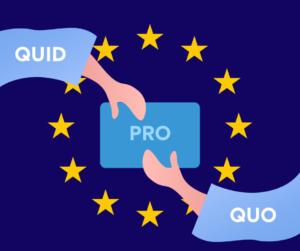Headquarters: Svetog Nauma 7, 11000
Office address: Đorđa Vajferta 13, 11000
Phone:: +381 11 4529 323

Talks about a (re)new(ed) pro-European alliance headed by French President Emmanuel Macron and Dutch Prime Minister Mark Rutte are gaining momentum. The partnership aims campaign together during the 2019 European elections and establishes a political group in the European Parliament (EP). The new group will unite parties from the Alliance of Liberals and Democrats for Europe (ALDE), in which Rutte’s Party for Freedom and Democracy (VVD) is a member, with Macron’s La République En Marche (REM) and its sympathisers across Europe.
At first glance, the new alliance seems like the wet dream of the EU-friendly Balkan audience. Macron is well-known to the wider public. Mark Rutte, Prime Minister of the Netherlands since 2010, on the other hand, even if less known, is also among Europe’s most influential politicians, has emerged as a bridge between France and Germany and the head of the EU’s North bloc which unites eight member states.
Both Macron and Rutte have a solid track record of defeating anti-EU parties in their own countries and one could expect them to transfer their know-how at the European level during the 2019 elections. Not only that. Both are young and energetic openly pro-European leaders who are likely seeking the replacement of some of the grey-haired Brussels elite, which has been giving the EU the image of a closed nest of boring bureaucrats. Good news, however, the Western Balkans should not have their hopes high.
Rallying the European banner against anti-EU forces on elections day, a method which has won polls for Macron and Rutte is not a straightforward exercise. It involves making concessions to the undecided electorate that ears some of the arguments made by anti-EU parties. Support for Western Balkan enlargement is one of those issues which could be scapegoated by both leaders. The Western Balkan Summit in Sofia was a case in point. The decision to postpone the opening of Albania and Macedonia’s accession negotiations came exactly from the French President and Dutch Prime Minister. More cold water on enlargement is expected to come as Macron and Rutte will have to compete with anti-EU parties such as Marine Le Pen’s Front National and Geert Wilders’ Party for Freedom for the votes of the two-thirds of Dutch and French citizens who are against enlargement.
Replacing the establishment in Brussels also comes at a price for the Western Balkans, because it will weaken the influence of a traditional supporter of enlargement – the European People’s Party (EPP). The EPP is the largest group in the EP and the most represented one within the Council. Although it has been criticised for the covert appointment of Martin Selmayr as Secretary-General of the Commission and the autocratic tendencies of some its members, notably Victor Orban, the EPP’s strong weight within the EU institutions has made possible the appointment of figures supportive of enlargement to senior posts. Examples include EP President Tajani and European Council President Tusk. The Macron-Rutte alliance is a direct challenge to EPP dominance which could lead to the selection of more accession-wary politicians in key positions in Brussels. Upon the unification of ALDE and REM, the new political force comprises eight of the heads of government within the European Council, directly increasing its influence in the selection of the institution’s next President. Moreover, if Macron and Rutte’s opposition to the Spitzenkandidat system prevails, primacy in selecting the Commission President will be retained at the level of the European Council, rather than handed over to the EP, which is to the benefit of the new alliance.
Lastly, Macron’s temptation to weaken the EPP from within by pitting the party’s liberal wing, as exemplified by Angela Merkel, against its conservative wing, headed by Orban, could exacerbate the East-West rift within the EU. As a consequence, the Western Balkans countries, which are geographically and politically close to Eastern Europe, will risk being put into the basket of illiberal democracy, notwithstanding their reform efforts.
Even if Macron-Rutte alliance does not become the biggest group in the EP or the leaders do not manage to agree on issues such as eurozone reform, the bloc is going to retain the role of a principled opponent of early enlargement that demands the implementation of comprehensive rule of law reforms. In this context, enlargement-friendly presidencies or leniency from the EU due to the geopolitical competition of international actors will not suffice. The Western Balkans countries will have to step up reforms in order to make the tough case for enlargement and convince the French and Dutch leaders to abstain from using their vetoes in the Council.
Image source: http://www.zimbio.com
The author is Venelin Bochev, an intern at the European Policy Centre – CEP.